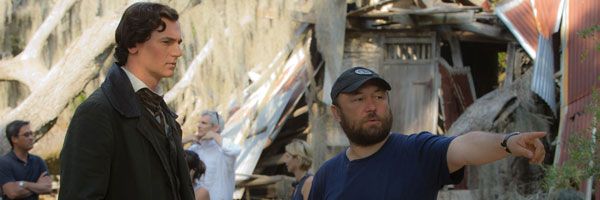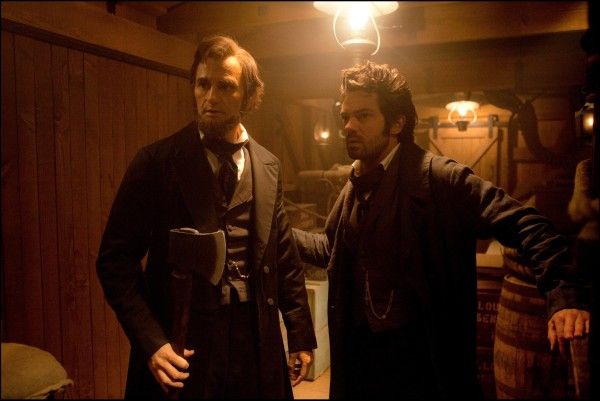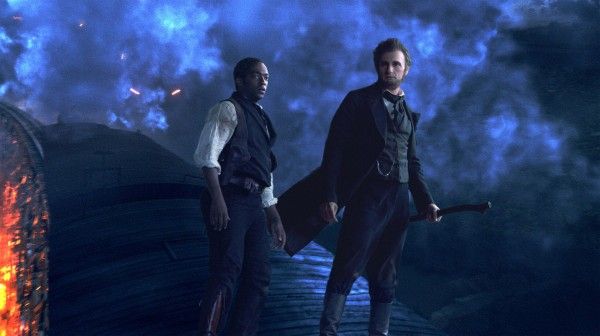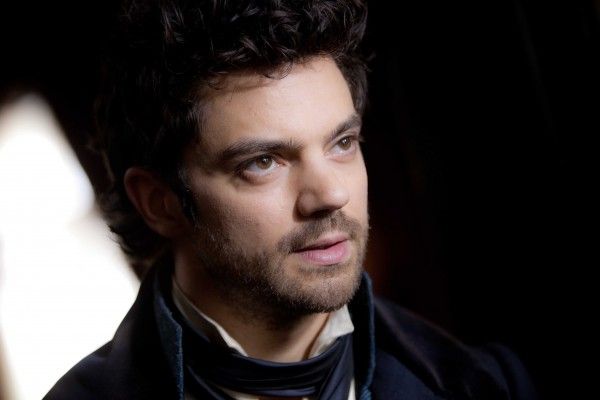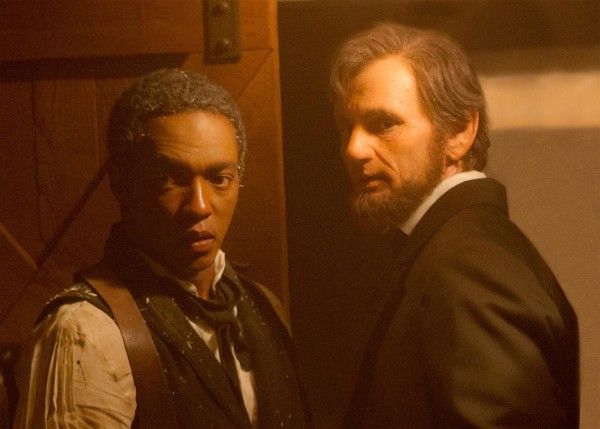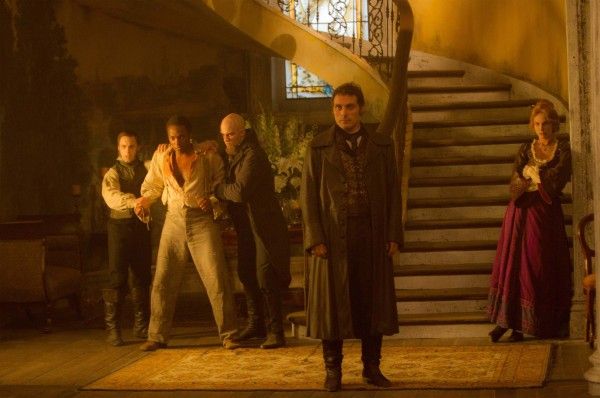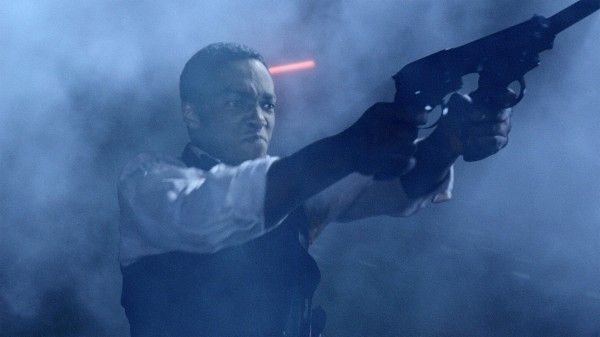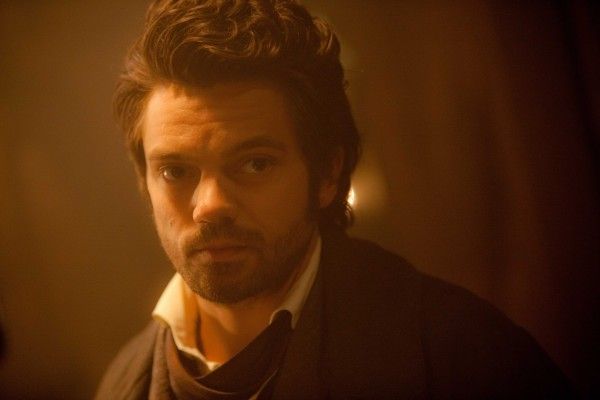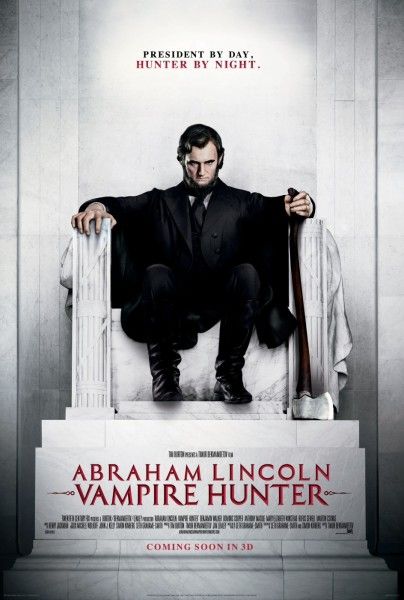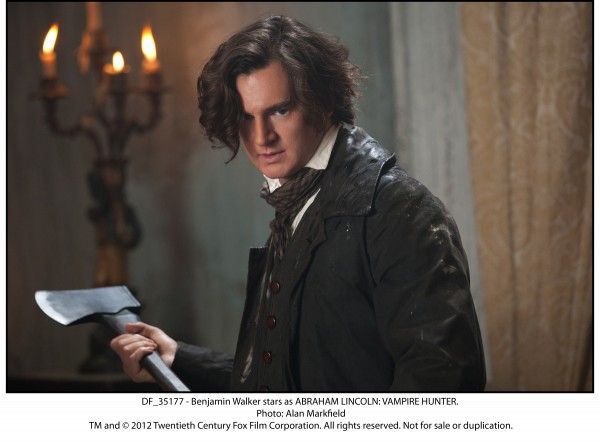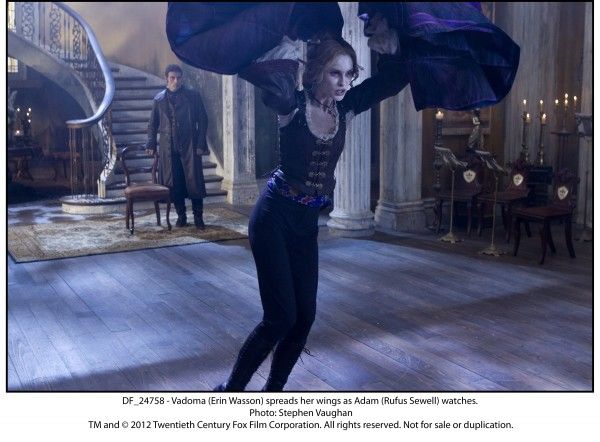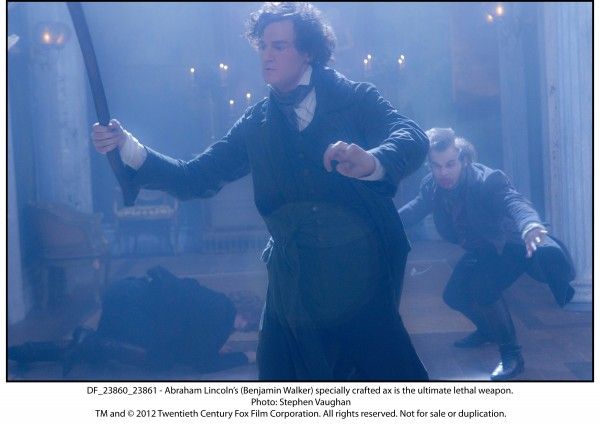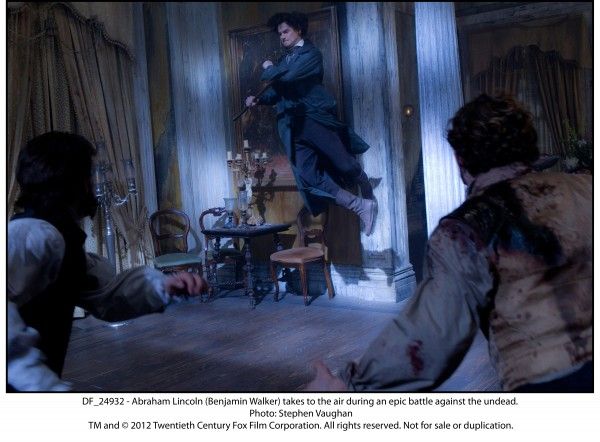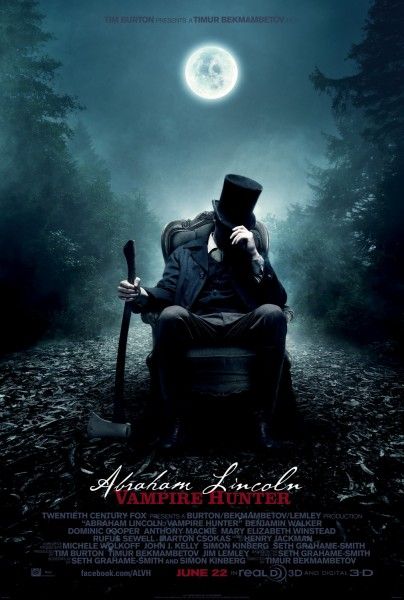When you think of one of the most famous men in American history, you don't immediately consider Russian director Timur Bekmambetov (Wanted, Night Watch) as the one who should tell his story. But when you're movie imagines Abraham Lincoln fighting vampires, perhaps it makes a little more sense. In Abraham Lincoln: Vampire Hunter, Benjamin Walker plays of one of our greatest Presidents with one small change to his life story: he fought vampires. While it might sound a bit crazy, the secret to why it should work is that everything else is grounded in reality. It's one of the reasons Marvel movies work. In Iron Man, everything is realistic except for the fact that you're asked to believe a man can fly around in a metal suit. Same with Hulk. Everything is real except you're asked to believe a man bombarded with gamma rays could become this green monster. With Abraham Lincoln: Vampire Hunter, everything is historically accurate except for the vampires.
Last summer I got to visit the production when they were filming in New Orleans. I participated in a group interview with Bekmambetov and producer Jim Lemley. They talked about grounding the film in reality, why they made certain casting decisions, the vampires, filming in New Orleans, the look of the film, the 3D, how they get involved, and so much more. Hit the jump for more.
Before going any further, if you haven't seen the red band trailer, I'd watch that first.
Question: So a Russian director taking on one of the biggest political figures in US history.
Timur Bekmambetov: Yes, I did.
Jim Lemley: That is true.
Yeah and so I guess what-? I started making a joke, but it didn’t obviously fly. What would-?
Lemley: Yeah, but I got it.
What was the motivation for you saying this is something that I really want to—this is—I can tackle this. This is something that I want to do?
Bekmambetov: It’s a book. It’s Seth [Grahame-Smith]’s book. It’s great material and his unique ability to connect two different genres biography and fantasy vampire movie, genre movie.
Lemley: And it’s a character that represents like the kind of the best idealistic version of humanity, which is always interesting.
Now Seth’s book is already you know historically accurate in a lot of ways with the larger details and some of the small details of Lincoln’s life outside of the whole fantastical thing with vampires. How did that book and now the movie kind of change or broaden your understanding of who Lincoln was?
Bekmambetov: Not only Lincoln, but in general the history because this movie will play a very interesting treat with us because it’s very interesting to find out what’s in real history, what we know, how can it can be interpreted differently and it becomes more clear you know because history when I was reading books in school it was quite boring and messy and sometimes you can’t understand why people are doing this or that.
They’re not relatable.
Bekmambetov: Now relatable yeah and the genre world helps to make it clear.
In what ways?
Bekmambetov: In a more emotional, more relatable way. Like you understand why it has happened because the historians they worked for governments, for political systems during the century every time and the history it’s just a mess. It’s a lot of facts, a lot of different opinions and a lot of propaganda mixed together and we cannot understand what has really happened and you cannot relate. My children don’t like to read historical books, but they will like—they will understand the history through our movie.
We were looking at a lot of the art before we came to the set and it’s always a matter of finding the right tone for something like this where you have a fantastical element, but it sounds like you’re really trying to ground it in reality. So can you talk a little about finding that right tone and working it in with your style? I mean I've seen your past films. They can be very stylized, type of stylized and just finding that right tone, finding the balance and how you’re approaching it from the directing standpoint.
Bekmambetov: I think the most important technique is to ground everything, to make everything—to make fantasy world grounded and relatable, just great characters. You will follow. You will understand. You will fall in love with and to move them through the action scenes, through the adventures and to develop, to open with them with the new world with new rules, with new ideas and it’s what we do. To find the character, to fall in love with and to go with him through this adventure, it’s like in any movie.
Do you feel like you’ve had to adjust your style of shooting action or any of that to fit into the reality world?
Bekmambetov: Yeah, of course. There are no guns. There are guns, but they’re very yeah, very primitive, yeah. Today we are shooting this scene when Lincoln—it’s his first assassination when the first time he was trying to kill a vampire and he fell and because the musket was not perfect and he was scared and it’s really it’s just try—what we do with the Ben Walker is an unbelievable actor—and all actors we’re working with, they’re great and they help me to create a world when you really believe that where the fantastic things happening, but the characters are every time not sure that it will happen. It’s not like for sure that the—you can throw in horses and running on top of the horses like on the surface of the road and it’s real. We’re trying to figure out how to make it real, how to make it not staged and not—just to be real.
Lemley: And there is also a certain sense of trying to find a thread to tell a story with a certain sense of dignity.
It’s not really tongue in cheek or anything like that.
Bekmambetov: No, there is a lot of humor, but it’s not a tongue in cheek humor. Its humor makes this story relatable and grounded and makes them real.
Can you talk a little bit about the character? You mentioned Benjamin Walker, can you talk about casting him because he is pretty fresh faced to a lot of people, which people don’t go to the theater? I mean from what I've read there were better known actors that were up for the role, Josh Lucas and Andrian Brody. What was it about Benjamin Walker that really made you guys go this is our Lincoln?
Bekmambetov: He’s honest. He is honest and he is-
Lemley: And he posses that dignity.
Bekmambetov: Yes, he really believes and he is really determined to make this character great. I mean he is him, for me. He is Lincoln and it’s a choice. It’s very simple to explain why it’s him because Lincoln—we’re making a movie about a historical figure and it’s very important to us to have an actor who will be behind the Lincoln. He will be—he can stay behind. He is not—it’s not about a famous actor playing Lincoln. It’s just Lincoln.
Was there ever a point where you-? You read the book and then you’re dealing with Seth. Were there things that you wanted to keep in, but he took our or vice versa?
Bekmambetov: What do you mean?
Just moments like I know Edgar Allen Poe is not, or at least we were told Poe is not in the film or there are certain things that you wanted to keep in that he had taken out of the screenplay.
Bekmambetov: First of all, the story has to be solid and we’re trying to tell the story how he freed us, Lincoln. He changed the world 150 years ago and he changed the rules of the world and which we are telling the story and everything that gets into this story we use, if not we—unfortunately novel and the—the novel in the movie is two different formats. Yeah, we cannot-
Just along the lines of Jenna’s question, did Seth work the screenplay adaption as well? Were the deletions, certain parts of the book to the screen version were those Seth’s ideas to do that? It’s a pretty dense story? The whole framing device with the author, who is given the journals, is any of that in the movie?
Lemley: The journal is in the movie, but not in the same method or using the same place as it is in the novel.
Bekmambetov: Yeah, the core of the book is there and the details are a little bit different.
Lemley: It was just a great collaboration with Seth on one hand, teamwork, directing and organizing and running the development of the screenplay because a novel is just a different format than obviously a screenplay. A screenplay is a different set of rules as you all know and when you have to condense, fit, shape, twist, push, make something work in a different way ultimately there are additions to the screenplay than there are in the novel, you know with the characters and so forth.
Bekmambetov: And we were lucky because Seth is a great—not only great novel writer. He is a great-
Lemley: Great writer.
Bekmambetov: -great writer and he was with us all develop process and he did it himself, which was important because he kept the core, the soul of the book.
Can you talk a little bit about vampires? Recently vampires are very friendly or sparkly or whatever. Are you going to depict some gnarly, violent scenes with vampires in your movie?
Bekmambetov: No, vampires in our movie they are very violent. They are—They are mean and violent, but as human beings because we are not good either and in every movie—in Night Watch I understood that the vampires there it’s a—they represent us. It’s not different—it’s not a creature. They are—have human qualities. They have a tragic—there are tragic back stories and they have their—they are—vampire—the genre—vampirism is just a physical manifestation of our problems or our class. I don’t know.
Lemley: He brings—no, I think also another word that is good is complexity. Timur is bringing a certain complexity to those characters. The vampire isn’t just like what he’s saying, not just this or that. It’s complex.
Bekmambetov: And in our movie—this movie is about freedom and Lincoln gave us freedom and he didn’t get—he held us to be free and the vampire they have their own understanding what freedom is because they just live much longer and they feel they are a superior race and they have their own understanding and their understanding represents the understanding of some people, individuals say they think that—who has the power of course has to rule the world.
Can you talk a little bit about shooting down here and how much of this you’re using as a character, these great locations and this area?
Bekmambetov: It was a big decision because it’s easy to go to Europe and to shoot there, but we decided it’s better just to be here and to feel what—because this land, New Orleans, still has like a drama from the time when there was a Civil War. You still feel it here. You still feel there is a—this drama that happened 150 years ago is still here. You feel it. There is no conflict on the streets probably, but you feel people still thinking about it, still feeling it and it was a very dramatic time in American history.
If the title tells us everything that audiences need to know about the plot, what to you is the story, the deeper theme or the sort of emotional underpinnings that people are going to connect to if they are not immediately drawn to the idea of Abraham Lincoln hunting vampires?
Bekmambetov: First of all, it’s what—there was one line we were trying to use to remember why we are making this movie. It’s a Lincoln phrase that says, “Until everyone is free we’re all slaves.” And it tells a lot about him and about the movie and about—what about this movie. He had a unique ability to make—he has a unique ability first of all to make very tough decisions and to recognize what is good, what’s bad and at the same he was very open and very—he believed that the human beings can help themselves, can change their lives. They don’t need somebody else to rule them. They don’t need somebody else to teach them. We are smart and powerful enough to change our world as we need.
You’re a visual power and director, a formalist. How do you feel in terms of coming to a period piece, you are afraid that the audiences are going to say that slow motion cameras and CGI in a period piece is going to be a drawback to the audience? How are you going to approach it?
Bekmambetov: No, it’s a painting. It doesn’t matter what kind of paints you use. I'm following the same rules, the same—I'm using the same—which is world I mentioned and I made a lot of period commercials in Russia in the 90s. It was really fun because there was no film industry in that time and there was one bank that supported me to make shorts and to make 17, maybe, shorts about different kings and queens all around the world and I think it’s just world. It’s a world where we can—it’s like fantasy world. It’s like the period environment. It’s just a world you—it’s interesting to discover with the audience, to go there and to discover that world. I don’t feel—I mean of course horses are not as fast as cars or airplanes, but there is another—they’re not so controllable too.
Just in case we don’t get more time with you later on the set give us a little preview of the scene we’re going to be watching you guys shoot and what are the challenges of that particular scene for you?
Bekmambetov: What we’ll see today—what you will—what we will shoot today it’s the beginning of the big action scene. It’s the beginning of the first part, expositional part of the big action scene when Lincoln is chasing his enemy. His name is [Jack] Barts.
The man who-
Bekmambetov: The man who killed his wife, yeah. Mother, sorry. And he—and it’s the beginning, it’s set up and the whole scene will be produced in 3D and the horses, everything will be digital and-
WETA’s doing that?
Bekmambetov: Yes. It will be three minutes nonstop action, stampede sequence with hundreds of horse and people and Lincoln and Barts running under horses, on top of horses.
Is Trent Reznor going to be doing the soundtrack?
Bekmambetov: No, unfortunately, we discussed that but we didn’t find a way how to do.
So he’s not involved?
Bekmambetov: No.
Oh. Is the film being shot in 3D or is it post converted?
Bekmambetov: We are shooting in 2D with—we made a lot of experiments and we understood how to do it. If you plan ahead, if you know what you’re doing then it even helps you to create the convergency. We’re using convergency not as a technical—not as a technique just to create 3D movies, but as a film language element because with the—when you are doing it in post you can change the world. You can use it as a tool to break the rules of the world.
Lemley: It’s not an afterthought. It’s not.
Bekmambetov: Like this can be in 3D. It can be far behind and be huge. You can change the perspective like in an ancient—icons. It’s a reverse perspective. Everything was closer. It was smaller, further away. It’s big. You can play with the reality and the 3D is a tool to play with it.
I've seen a lot of close convergence recently where the studio spent a lot of money on the action sequences and they’re all beautiful in 3D, but all the dialogue scenes are in 2D. You can take your glasses off. Will this have 3D dialogue scenes through the whole movie or you guys post converting specific stuff?
Bekmambetov: It will be converted. Everything will be 3D, but you understand right because there is no reason to—there is no reason to do 3D convergency for dialogue scenes because when you are fighting the distance means a lot. When you are in dialogue you have to think about it because if we’re talking, and I’m closer, it’s one—you have to use it as a film language element, the space. Then it has a sense. If it’s just because you have the 3D cameras and you have to shoot 3D and there is no—and you’re using still the same composition then it’s meaningless and then you can reduce. You can—my answer is simple. Nobody knows the language here. This language is still in development, the film language, 3D movie and the dialogue is the biggest—the traditional dialogues is the biggest problem because nobody knows yet how to interpret it in 3D world and we are in the process too. We’ll see.
Editor's note: After Bekmambetov left, we continued with just Jim Lemley:
Can you talk about the actual look of the vampires?
Lemley: It plays through layers and evolutions and different stages of it, depending on what's happening. Different extremes. So it has all the conventional things, but it looks at it in a very unconventional way with the visuals.
Who did the vampire design?
Lemley: A guy by the name of Greg Cannom who, amongst other things, won an Oscar for "Benjamin Button."
Have you had any changes in scheduling due to the possible flood coming?
Lemley: No. Who knows, they don’t seem to know. . . It seems to not be a big issue. It is a big issue, but it seems to not be a big issue in terms of our production.
Taking a real character and fictionalizing their life into an action, was their ever a concern about undermining the real things Abraham Lincoln did in his life? Or does the movie compliment them in some way? Life outside of vampire fighting.
Lemley: Certainly we thought about it. We hope we thought about every perspective regarding it. I think from our point-of-view, we're making a movie, not a historical record and...art's a metaphor. I think any way you can explore metaphor to make it relevant or expose it to a bigger audience or tell a story in a way it hasn't been told -- I think that's what we're attempting to do. We feel we remain very truthful to the essence of Abraham Lincoln, because it's very important to us. He's doing these ridiculous, insane things, but his character is the Abraham Lincoln that you know. He's a moral man who represents the best of humanity. I think what is a noble ideal for all people, to try and attain and achieve.
I mean the greatest thing for us when we made -- in fact, the first conversation we had with Seth, the novelist and writer...I asked a version of that same question. He said, "call a guy named Tom Schwartz, who's the curator of the Abraham Lincoln Museum in Springfield" -- so the foremost Lincoln historian in the country -- they totally endorse the movie, support it. Seth showed me pictures of him at the Springfield Museum holding Abraham Lincoln's axe. So, their view is the same. Anything to open the door to a bigger audience.
Some projects take very long to get to screen, others very quickly. How quickly did this project come together?
Lemley: It happened super fast. I live in France, Tim lives in London and Timur lives in Moscow and one morning we wake up to a book proposal (we all have the same agent). We had done an animated movie called "9" and had had a great experience, wanted to continue to do something. So we were looking for something. We cast about for year -- we're all pretty picky -- and we couldn't find anything. But we woke up and there was this e-mail about this book proposal from the guy who had written "Pride and Prejudice and Zombies," and it was called "Abraham Lincoln: Vampire Hunter" and without planning to, we were all intrigued by the title. We read it within two hours, we were all on the telephone by noon and we just knew this is what we should do. Nobody was, 'Eh, I'm not sure' – this is what we should do.
And we didn't want to be involved with the studio at all. We financed it ourselves, acquired the book rights, we hired Seth to write the screenplay. All that stuff was done in two weeks. He was finishing the book (because he hadn't finished at that point), but in the year it took to do that, the only people involved in the conversation and decision-making were the three of us. So we developed a script that was great and along the way they both kind of fell in love with it. It's great being a producer with two directors who could imagine themselves directing it. But we did a straw pull and realized Timur's version of the movie is what we all wanted to see. We wanted to see that, including Timur.
So at the Cannes film festival last year, where Tim was on the jury, we met up and figured out, 'OK, Timur is going to direct it and let's take it out to the community and see who wants to be involved.' We took it out to the town in September and had the great fortune that every studio, except Disney -- which, it may not be in their quiver -- but every studio was interested in financing the picture, being involved with us, it was a great experience, everybody was fantastic, and ultimately Fox was the best home for us. We just said, 'we're going to start on this date and it'll be this long and we'll deliver the movie on this date' and they said, 'OK.' It was that fast. Quite unusual.
Tim Burton and Timur are two, visually-strong directors -- what was their relationship like and how did their design overlap?
Lemley: Certainly strength can be in opposition, but in this case it's not in any way. The combination makes something greater. I think Jimmy Page said one time that the Led Zeppelin members were individually amazing musicians, but when they came together they created a fifth element, the combination of that that made something more interesting. For sure that's what's happened here and also on "9." The opposition is not in conflict, it creates something better, more interesting.
What are pros and cons of the title of the film? I mean, it is the most descriptive title ever in the history of movies. But on the other hand, I have a feeling some people are going to go "that's for me" or "that's for me." And for the ones who are going to say "that's not for me," how do you convince them that maybe it is for them?
Lemley: Yes. And that's a good question. Because of course it's a very polarizing title and it can also play as a joke, which can be interesting for two minutes and then it's not interesting at all. I think ultimately a lot of it will be in the marketing of the picture because it's not just the title. It will be a whole host of other things that will be included along that road that will enhance that title. Will it show that it's something different? For example, there was a recent article in The New York Times with a quite conventional image, very beautiful conventional image, and if you'd been in Gettysburg and imagined you had a color camera and taken it. But on top of it is Abraham Lincoln: Vampire Hunter and it's kind of this subverted idea of that. So I think standing alone the title would be hard to overcome, but in addition to what exists now and what will exist I think it will be okay.
Will the tagline be "four score and seven years ago... there were vampires?"
Lemley: Can't you just imagine the first trailer starting off with that?
The movie is very faithful to history, but what about the vampire mythology? How close to the classical vampire mythos are you keeping or are you giving a more modern type look?
Lemley: Vampire rules in our movie are, again, the basic is sort of like the look of vampires. There's the basic idea of vampires have fangs and vampires drink blood and all the things you know about vampires. And then there's minor and different little things woven into the mythology that are unique to our story which I want you to discover. I don't want my bad interview to tell you.
Do you think that the problem or issue that some people have with the idea of Abraham Lincoln: Vampire Hunter is being overstated a bit because historical fiction has been around for a long time?
Lemley: I think it's a thousand percent overblown. I think it's just not an issue at all. I think that for precisely the reason you're saying. I read a book 20 years ago when I was at University called Freedom by William Safire, who has passed away and it was kind of an archetype of the serious writer and it was about Abraham Lincoln's life and the prologue of the book was something like this: "if such and such is fact, and such and such is fiction, and if they don't connect then they're definitely fiction." So he was doing that then. Or hip-hop music, taking an original idea. . . or let's go back Led Zeppelin. They're taking blues music and running it through a different intellectual idea. So I think all art builds on what has been made before. All stories build on what came before. So I think it's the natural evolution of storytelling.
I thought the choice of Ben Walker seems to me a little like when Henry Fonda played Lincoln 1939 in Young Mr. Lincoln, and that was before he was "Henry Fonda." That was the role that made him. When you chose someone like Ben Walker, what exactly went into choosing him? Was there a long audition process? Did other bigger names read for the role as well? Was there any opposition from the studio about putting a big budget movie on the shoulders of someone who's still really fresh?
Lemley: Last question first. With the studio, when we began this journey, part of our pitch was that we were going to cast whoever was right for the role. We're not going to hang it on some name because the idea for us was that it was very important for you to believe this happened. Not to believe that this is an actor that I know and now he's playing Abraham Lincoln. So we want whomever it is to just disappear. And it could have be a big name, for sure. It could have been. But the idea was that whoever it is has to just disappear into that role. So then you're casting about what you're trying to find, obviously it's an ambitious role, it's a difficult role. It's somebody who has to play 20-55, and they have to play it convincingly. They have to span all these times, not just the physical appearance but how you manifest the body and move. You move differently when you're 40 and your center of gravity changes. You're different. Older. Younger. How can you do that? So you make a list of all the criteria. It's a very short list. It's a little bit like when I remember hearing Quentin Tarantino talk about casting Inglourious Basterds and if he hadn't found Christoph Waltz it would have been hard to make. Same for us, if we couldn't have found Ben Walker, it would have been very hard to make the movie. Somebody said, "you need to go see this guy in New York, he's in this play called Bloody Bloody Andrew Jackson." So we flew to New York to see the play and he just owned it. And Andrew Jackson is very different; the essence of Andrew Jackson is kind of the opposite of the essence of Abraham Lincoln. So he was amazing in that role. And then we started working with him. Just working with him without make-up on, meeting in New York, Los Angeles and talking, and doing all these things that ultimately lead to a process where Greg Cannom, this make-up artist made him Abraham Lincoln. And he came and delivered the Gettysburg Address to us, and it just gave us chills. Unbelievable.
At this point, did he know that you were coming to see him perform?
Lemley: Yes, which is good when you know someone can deliver under pressure, right?
You guys chose WETA for the special effects. Obviously there are a lot of special effects companies out there. Did you ask for the different companies to show you some stuff, or did you just say, "we trust you."
Lemley: No, we had quite a rigorous process about who would do what. WETA is not the only company involved, but it certainly is involved in the signature iconic moments of the movie. It's like playing the World Cup. It's like ILM, WETA, certain companies can do that. It's a much easier leap with them. There are not many other people (or companies) in the world who can do that.
Abraham Lincoln: Vampire Hunter will be released June 22. For more from my set visit:
- 30 Things to Know About Abraham Lincoln: Vampire Hunter From Our Set Visit; Plus Video Blog Recap and New Images
- Benjamin Walker Talks Research, Balancing History with the Supernatural, Playing Different Ages and More on the Set of Abraham Lincoln: Vampire Hunter
- Dominic Cooper Talks the Scope of the Film, Finding the Tone, Returning for Captain America 2, and More on the Set of Abraham Lincoln: Vampire Hunter

